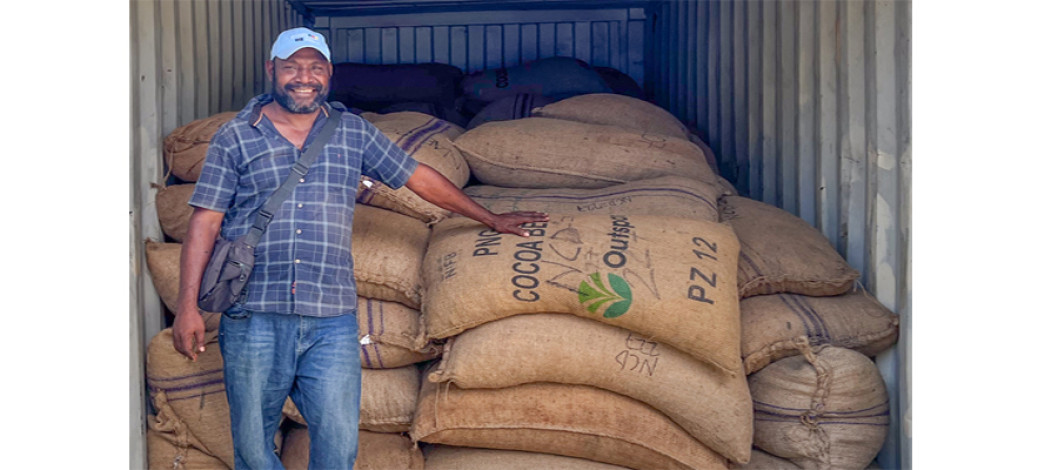
From Left: With support from the Food and Agriculture Organization of the United Nations and the European Union, Sperian Kapia’s cocoa cooperative was connected to a chocolate company that pays a higher rate for their cocoa beans, increasing the incomes of local cocoa farmers. FAO. Right: Gaining access to new and niche markets is crucial for remote farming communities, allowing them to sell their products at competitive prices and gain valuable insights into market trends. FAOP. photo: Collected
06/11/2023: From the hamlets where Sperian Kapia and his fellow cocoa farmers live by the massive Sepik River, it takes more than four hours by boat and truck through the rugged, dense rainforest of the Pacific Island state of Papua New Guinea to get to Wewak, the nearest town of about 25 000 people.
Not surprisingly, reaching profitable markets with the painstakingly cultivated cocoa beans that go to make chocolate is one of their biggest challenges. But with support from the Food and Agriculture Organization of the United Nations (FAO) and the European Union (EU), Sperian’s cocoa farming group has been making important breakthroughs that are already bringing benefits to the community.
Sperian says that the FAO-led, EU-funded Support to Rural Entrepreneurship, Investment and Trade in Papua New Guinea (EU-STREIT PNG) programme “has given us big exposure, which has connected us to a market and supported us with many important things such as cocoa seedlings, the materials to farm cocoa.â€
A major turning point came when the programme took him and several other farmers to attend the International Food Service and Hospitality Exhibition in Singapore in August 2022. There, Sperian was able to clinch a deal to sell their beans to the Queen Emma Chocolate Company, a subsidiary of Papua New Guinea’s Paradise Foods Ltd. The chocolate company is paying a higher rate for their dried beans about USD 20-27 (PGK 70 to 100) more than the average price offered by intermediary buyers.
That’s had an immediate impact on the 240 farmers in the MUPA Cocoa Cooperative Ltd, of which Sperian is the Director. The group gets its name, MUPA, from an ancient village which once lay nearby, recalling their ancestors and the history of their land.
The additional income has allowed MUPA and its affiliated cocoa processors to pay local farmers 21 percent more for the wet beans, which they then ferment and dry, giving them their characteristic aroma.
“This helps the parents in my community to pay for their kids’ school fees, buy utensils for their houses and better food to improve family’s diets,†comments Sperian. In the longer term, the community also hopes to use the money to “continue to support our farmers in terms of social development; we have a school and want to support it with infrastructure and educational material, also health care,†Sperian says.
Clinching this kind of market access is vital for remote farming communities and not just because access to niche markets allows them to sell their products at competitive prices. It also enables them to gain valuable insights into market trends, using the knowledge to enhance their quality and productivity.
Sperian and his fellow farmers have also been able to reach new markets further afield. Through the support of FAO’s EU-STREIT PNG Programme, government agency, Papua New Guinea’s Investment Promotion Authority, and the Queen Emma Chocolate Company, they were introduced to a new potential buyer from New Zealand.
The farmers sent 20 kilograms of their dried cocoa beans to New Zealand. There, chocolatier Oonagh Browne was so impressed by the quality that she travelled all the way to visit Sperian’s cooperative and agreed to buy 15 to 20 tonnes of cocoa-dried beans annually.
Browne says she hopes to “change the imbalance that’s in the chocolate industry and … do true, real, fair pricing and bring the Pacific cocoa out into the world and share the incredible work that these cocoa farmers do.â€
Connecting the cocoa farmers with chocolate makers willing to pay fair prices for good quality beans is just one example of the work that the EU-STREIT PNG programme has been doing to help improve the lives of farming communities in Papua New Guinea’s East and West Sepik provinces.
As well as the cocoa industry, the focus is also on increasing sustainable and inclusive economic development of rural areas through improved economic returns and agri-business development environment in the vanilla and fisheries value chains.
Sperian’s new market connections demonstrate that however remote the communities, with the right support, they can link up with the markets they need to achieve a decent livelihood in return for their hard work.
Source: Online/GFMM
Comment Now